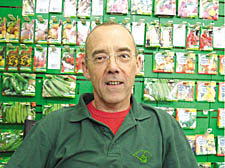|
|
 |
| |

Deputy manager and training boss Mike Jackson |
Hope grows on trees
An innovative garden centre is giving disadvantaged people a second chance in life, writes Jane Wild
AT Camden Garden Centre, education goes hand-in-hand with the job for some of the staff.
Student trainees at the centre, in Barker Drive off St Pancras Way, take advantage of a programme tailored to their needs.
And what makes the business unusual, is that it was founded with a remit to take on those from disadvantaged backgrounds; for instance, people who don’t have qualifications, who have been out of work for an extended period, had a drug or alcohol dependency or have criminal convictions.
For someone without qualifications it offers a second chance, combining work and study to pave the way into a new career. A typical trainee will leave with a level II NVQ, forklift operator certificate, first aid certificate and driving licence.
In addition, the garden centre sponsors college courses and gives day release so trainees can gain extra qualifications, for example, in horticulture. Trips to places like Kew Gardens or the Eden project in Cornwall are also organised.
Deputy manager and training boss Mike Jackson said: “Trainees are often from the inner city and have never seen big, beautiful gardens or fantastic species of plants.
“There’s a real wow factor when we’ve taken them. It’s also a good motivational exercise as well as educational and team-building.”
Michael Quinn, 24, has been a trainee at the centre for two years.
Previously a serial offender who completed two prison sentences, before he joined the garden centre, Michael says he was “getting nicked all the time; for fighting, nicking cars, drugs”.
He had even taken part in a BBC reality show, called Make Me Honest, which followed a few people who were leaving prison and hoping to go straight.
He spent his childhood moving around, and missing a lot of school meant he left without a GSCE.
Sometimes unable to pay for a train to school, he would walk from his home in Kennington, south of the Thames, to Mitcham in Surrey.
But it was during stints bunking school and helping out on a flower stall (until the teachers caught him) that an interest in horticulture was ignited.
Michael left the garden centre last Friday, having picked up a fistful of certificates, and is now heading to Northampton to study arboriculture.
He says: “I knew I had to do something. I’d been in prison twice, which leaves a big black mark on you.
“I was quite surprised how well I got on with studying and now I’ve got all these NVQs on my CV.
“It makes you feel 100 times better – I never thought I’d ever have NVQs or be going to college. It’s mad.
“This is the best place ever, there is so much support, but it’s good that I’m going because someone else will get my place.”
Trainees who have recently left include one who joined the civil service and two who set up landscape gardening businesses.
A 2002 government survey found that the biggest factor leading to re-offending was unemployment, highlighting the importance of projects like that at Camden Garden Centre.
It has picked up various awards for its work, including UK garden centre of the year 2002, and is currently up for the most outstanding centre for education and training in horticulture, from trade magazine Horticulture Week. It has also received Europe-wide recognition. In September centre staff are invited to speak about their experiences working with ex-offenders, at an EU-funded meeting in London including visitors from Italy, Belgium and Portugal.
But although highly encouraging, it is not just success stories like Michael’s that matter, according to Mike Jackson.
He says: “We had a trainee who was an ex-heroin user, who was doing well but then suddenly disappeared.
“We discovered he’d gone back on heroin and was in prison, so we arranged for him to receive certificates for the qualifications he had completed.
“He was over the moon as he’d never believed he would have a qualification and that made me realise that success manifests itself in different ways. Although he was back in prison, and in the short term it wasn’t a success, this may have given him hope for the future, and may be the spark he needs when he gets out.” |
 |
| |
|
|
|
 |
|


